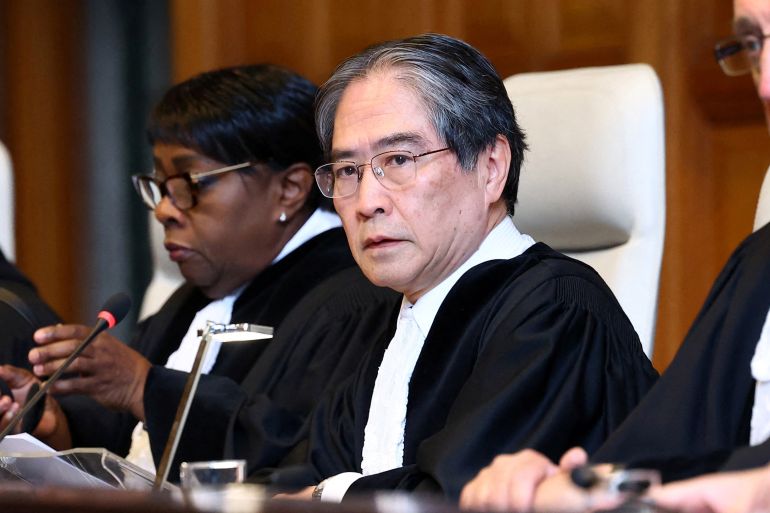After ICJ ruling, can UN relief agency UNRWA resume full Gaza operations?
ICJ states that Israel must allow aid into Gaza, ensuring food, water, medicine, and shelter for the Palestinian population.

Published On 22 Oct 202522 Oct 2025
Save
The International Court of Justice (ICJ) has issued an advisory opinion saying that Israel must support United Nations relief efforts in Gaza, including those conducted by the UN Relief and Works Agency for Palestine Refugees (UNRWA), regarding Israel’s legal responsibilities towards UN agencies and other international organisations operating in the occupied West Bank and Gaza Strip.
The court found that Israel’s allegations against UNRWA – including that it had been complicit in the Hamas-led October 7, 2023 attack on Israel – were unsubstantiated.
Recommended Stories
list of 3 itemsend of list
“The court finds that Israel has not substantiated its allegations that a significant part of UNRWA’s employees are ‘members of Hamas … or other terrorist factions’,” said ICJ President Yuji Iwasawa.
The court also said that Israel, as the occupying power, had to ensure that the “basic needs” of the Palestinian population of Gaza were met, “including the supplies essential for survival”, such as food, water, shelter, fuel, and medicine.
A number of countries had halted funding for UNRWA after Israel’s accusations, jeopardising one of Gaza’s most desperately needed lifelines.
Israel was also able to use the accusation to effectively ban the agency from the enclave – as well as the occupied West Bank and occupied East Jerusalem – in January of this year, forcing Gaza’s population to rely even further upon Israel for the food, aid and resources needed to sustain life.
Israel has severely restricted the entry of aid into Gaza, leading to a famine that now affects children, the sick and the vulnerable in the enclave.
What did UNRWA do in Gaza?
Before Israel banned it from bringing in aid into Gaza, UNRWA was Gaza’s main provider of humanitarian and social services. It supported about 1.4 million Palestinian refugees, operating schools serving some 300,000 children, health clinics offering primary care and vaccinations, and large-scale food and cash assistance programmes.
Advertisement
UNRWA also helped coordinate shelter and relief efforts, run community and mental health initiatives and, under the face of Israeli blockade, served as a de facto public service provider.
The UN agency has however said that it is able to carry on operating in Gaza and elsewhere, although it is heavily restricted.
Does the ICJ ruling mean that UNRWA will fully resume operations?
That is not clear.
According to a statement issued by UNRWA’s Commissioner-General Philippe Lazzarini in the wake of what he called the ICJ’s “unambiguous“ ruling, Israel “is under an obligation to agree to and facilitate relief schemes provided by the United Nations and its entities, in particular UNRWA”.
But the decision issued by the ICJ is an advisory opinion, and the world court has no power to enforce it.
In a statement put out on social media, Israel’s foreign affairs spokesperson, Oren Marmorstein, claimed that Israel categorically rejected the ICJ’s opinion.
In addition to repeating Israel’s prior accusations against UNRWA without adding any corroborating evidence, Marmorstein went on to claim that Israel “fully upholds its obligations under International Law. Israel fully rejects the politicization of International Law, which seeks to produce political outcomes and impose measures intended to harm the State of Israel”.
Does Israel uphold international law?
Not according to many.
As well as its illegal occupation of Palestinian territory, global legal authorities have repeatedly accused Israel of entirely disregarding international law. In addition to widespread accusations of torture, arbitrary execution, collective punishment and using food as a weapon of war, both Israeli Prime Minister Benjamin Netanyahu and former Defence Minister Yoav Gallant are subject to international warrants on charges of war crimes.
None of these include the charge of genocide currently being considered by the ICJ and since affirmed by numerous organisations, including Amnesty International and the International Association of Genocide Scholars.
Is this the first time Israel’s accusation against UNRWA has been refuted?
It is not.
Two investigations in 2024 – one led by France’s former Foreign Minister Catherine Colonna in April and another by the UN’s Office of Internal Oversight Services (OIOS) in August – both failed to find evidence fully supporting Israel’s claims, although the latter did acknowledge that some individual employees may have been involved.
What countries halted or suspended funding of UNRWA as a result of Israel’s accusations?
Following Israel’s claims, major donors, including the United States, the United Kingdom, Germany, Canada and the European Union (EU) all halted or suspended funds for the UN agency.
Advertisement
The majority, including Canada, Sweden, Australia and the EU, all resumed funding after Israel was unable to provide evidence to support its claim.
How much damage has been done?
We may never know.
Israel has killed more than 68,000 people directly since its war on Gaza began two years ago. Countless more have died of hunger or secondary illnesses that could have been prevented with adequate aid.
Speaking on Wednesday, Dr Tedros Adhanom Ghebreyesus, the director-general of the World Health Organization (WHO), described how families in Gaza continue to endure famine, “overwhelming” injuries, a collapsed healthcare system, and disease outbreaks accelerated by Israel’s destruction of water and sanitation infrastructure.

